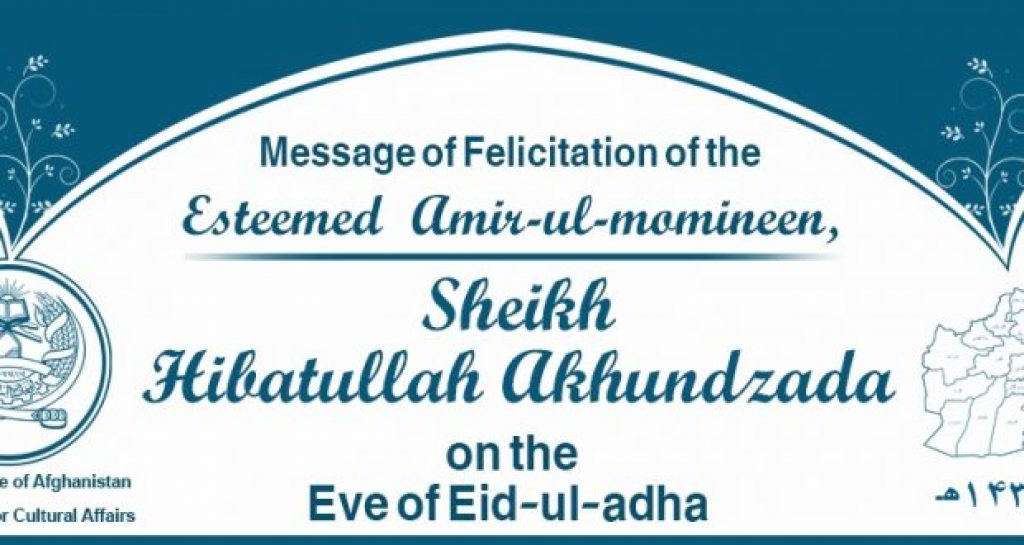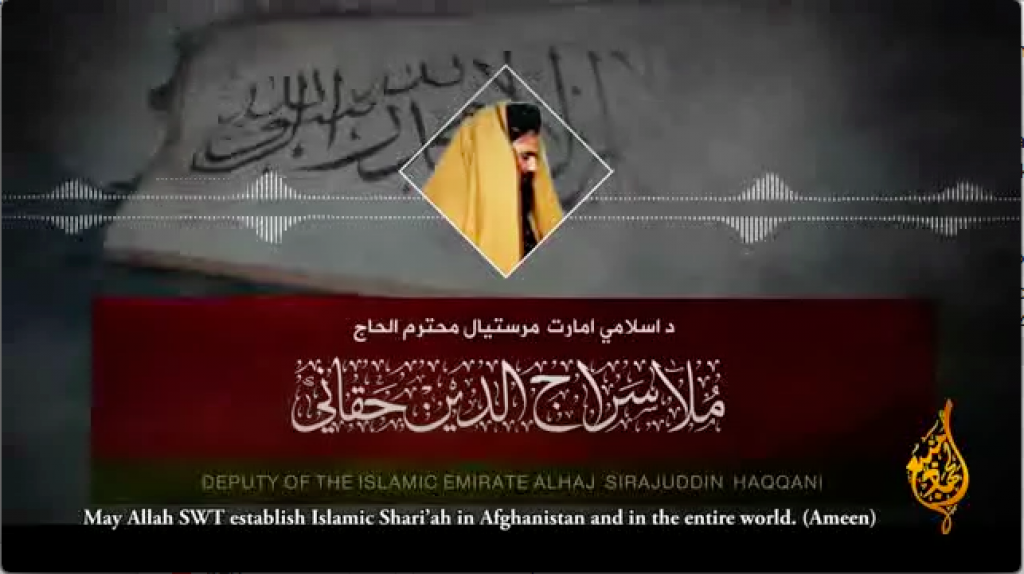
The Taliban released a statement attributed to its emir, Hibatullah Akhundzada, earlier today. The propaganda message was clearly crafted with a Western audience in mind. Like other statements published by the jihadist group, Akhundzada’s message should be subjected to scrutiny and not taken at face value, especially given that parts of it are directly contradicted by the Taliban’s own words and deeds.
Akhundzada explains that “peace” is only possible if the US and its Western allies, referred to as “occupation” forces, retreat from the country. “The main obstacle in the way of peace is the occupation,” Akhundzada’s statement reads. “Peaceful solution of the Afghan issue is the main pillar of the policy of the Islamic Emirate, should the occupation come to an end. To this end, the political office has been tasked to find a peaceful solution.”
Akhundzada’s ultimatum can be restated as: Hand Afghanistan over to the Taliban and there will be “peace.”
NATO is standing up the Afghan government in its brutal war with the Taliban. Should the US and its allies retreat from Afghanistan, as Akhundzada wants, this would only clear the way for the jihadists to advance further. No one could seriously think that the Taliban would end its jihad should the Afghan government be forced to fight on its own. Therefore, Akhundzada’s precondition for supposed “peace” is entirely self-serving — the Taliban is not offering to lay down its arms or give up its quest to restore its “Islamic Emirate” to power. The jihadists simply want their “foreign” enemies to leave, thereby making it easier to conquer even more of the country.
Akhundzada does not mention al Qaeda or its emir, Ayman al Zawahiri, despite the fact that Zawahiri has sworn bayat (an oath of allegiance) to Akhundzada and Al Qaeda in the Indian Subcontinent fights under the Taliban’s banner. Instead, Akhundzada claims that “every effort is being made to ensure no harm is posed to the neighboring countries and the world from” the “areas” under Taliban control. But this argument is undermined by the evidence.
Al Qaeda is exporting its jihad throughout the region from within Afghanistan. For instance, American and Afghan forces raided two large al Qaeda camps in southern Afghanistan in Oct. 2015. The camps were supported by the Taliban. US officials found ties between the camps and al Qaeda’s operations in other countries, including Bangladesh. In Oct. 2016, the US killed Farouq al-Qahtani, a veteran jihadist who not only backed the Taliban’s insurgency, but was also a senior figure in al Qaeda’s external operations arm, which plots against the US and the West.
On other occasions, the Taliban has connected its war in Afghanistan to the global jihad. In a Dec. 2016 video, the group celebrated its historical alliance with al Qaeda and threatened the US. The video featured al Qaeda ideologue Khalid al-Batarfi, who heaped praise on the Taliban. “Groups of Afghan Mujahideen have emerged from the land of Afghans that will destroy the biggest idol and head of kufr of our time, America,” Batarfi said.

Other senior Taliban leaders have also portrayed Afghanistan as part of the worldwide jihadi cause. On Aug. 29, the day before Akhundzada’s statement, the Taliban released a lengthy video that contained a brief message from Sirajuddin Haqqani, the group’s top deputy leader. “May Allah SWT establish Islamic Sharia in Afghanistan and in the entire world,” Haqqani, a longtime al Qaeda ally, said.
Parts of Akhundzada’s statement are outright absurd. “I would like to mention that we want a free, independent and progressive Afghanistan,” Akhundzada writes. The Taliban appropriates words such as “free, independent and progressive,” even though the group’s ideology cannot be reasonably described in these terms. Indeed, such passages reveal the extent to which the Taliban is writing for a Western audience, not its own supporters.
Akhundzada tries to portray the Taliban’s intentions as benign, but his claims are easily undermined. He writes that the Taliban’s “enemies are trying to smash the hope of our people regarding the future, creating baseless apprehensions that anarchy and [a] chaotic situation will prevail in Afghanistan, should the invaders leave and that discrimination based on ethnicity and religion shall sprout up.” He adds that some accuse the Taliban of seeking to “form a government of monopoly of power or (they claim) Mujahideen of the Islamic Emirate will try to take revenge on their internal opponents.” All of this is “misinformation” that is intended to justify the “continuation of the occupation,” according to Akhundzada.
But it is the Taliban that is spreading disinformation, not its foes.
For instance, the Taliban’s fighters immediately sought “revenge” on their declared enemies when they briefly seized Kunduz in Sept. 2015. “The occupation of Kunduz was marked by [the] Taliban carrying out systematic searches for human rights defenders – particularly women – as well as Government employees, NGO workers, journalists and UNAMA staff members, creating a climate of fear and resulting in the immediate displacement of human rights defenders from the city,” the United Nations Assistance Mission in Afghanistan (UNAMA) found. “UNAMA also documented the destruction and looting of offices and property belonging to Government, NGOs, United Nations and other civilian organizations.”
While the fight for Kunduz was chaotic, with the US mistakenly bombing a medical facility, it revealed the Taliban’s true intentions. UNAMA found that the situation improved dramatically once the Taliban was forced out, but the trauma caused by the jihadists’ actions lingered. “Following the Taliban withdrawal, the overall situation quickly returned to normal in Kunduz city, although human rights defenders – particularly women – remained reluctant to return,” UNAMA reported.
Akhundzada’s statement notes that the Taliban is fighting to implement “the sacred Sharia,” but he does not explain what this actually means. Akhundzada describes the Taliban’s ideal state as an “independent, Afghan-inclusive and prosperous Islamic system.” He does not admit that ordinary Afghans who run afoul of the group’s draconian legal code are subjected to abuse, torture and murder. The UN regularly documents the harsh punishments meted out under the Taliban’s “parallel justice” system.
Akhundzada claims that his group wants an “inclusive and representative system that stands for [the] aspirations of the people” and “in which all strata and ethnicities of a society” participate. But this is ridiculous. The Taliban is not a democratic movement, as it rejects democracy as inconsistent with its ideology. And should it reclaim Afghanistan, the Taliban would certainly maintain a “monopoly” on “power,” despite its assurances otherwise. Its version of sharia law mandates that only like-minded ideologues would have any real influence.
Note: The statement released today is attributed Hibatullah Akhundzada, but this does not necessarily mean he authored it. For example, from 2013 until 2015, the Taliban released statements that were supposedly written by Mullah Omar, even though he was already dead.








5 Comments
Excellent article. Well done.
It was a great article… but I wish rather than treating these subhuman murderers as real enemy, analyzing what they do in rational terms, we’d just treat them like the murderous scum they are. I don’t consider the Taliban worthy of discussion, negotiation, respect, or anything but bullets in faces like they gave Malala.
Where is Unpronouncable? Why isn’t he dead?
“Akhundzada does not mention al Qaeda or its emir, Ayman al Zawahiri, despite the fact that Zawahiri has sworn bayat (an oath of allegiance) to Akhundzada”
Where is al Zawahiri? Why isn’t he dead?
Trump can talk all he wants about troop levels but the honchos are in Pakistan under ISI protection and that’s all we need to know.
Like the Ltte in Sri Lanka, Sudanese Lords Army, Touaregs in the Sahara, Spanish ETA Basque, KPP- Kurds in Turkey-The Taliban have popular and widespread support in thier home land and cannot be wished or exterminated away no matter how barbaric they are or what nefarious company they keep. the situation in Afghanistan is financially unteneble for the coalition but the alternative is a failed state like Libya, so for now the ground game shifts into a low intensity insurgency which allows all players to continue – winners being the Taliban pumped up with KGB tech support and Saudi finances and losers being the Afghan govt, and the coalition with steep funding cutbacks on thier budgets.
ISI are the Taliban’s Number One sponsors.
Arrest some ISI generals (active and retired), get them in the dock at the ICC, and watch Taliban activity decline.
http://www.tolonews.com/afghanistan/several-taliban-leaders-could-join-peace-process-gen%C2%A0raziq